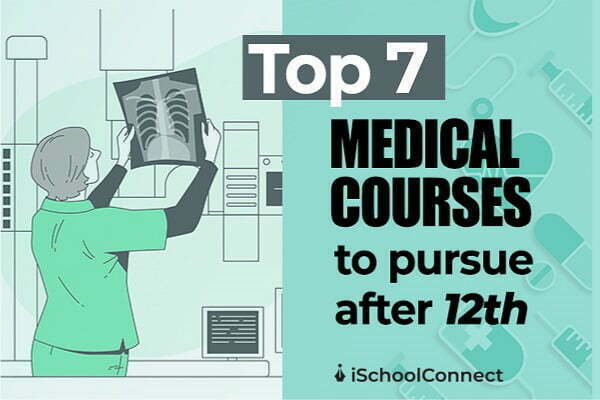Table of Contents
- Why choose medical courses after 12th grade?
- What are some of the best courses after 12th in the medical field?
- 1. Bachelor of Medicine, Bachelor of Surgery (MBBS)
- 2. Bachelor of Physiotherapy (BPT)
- 3. Bachelor or Diploma of Nursing (B.Sc. Nursing)
- 4. Bachelor of Dental Surgery (BDS)
- 5. Bachelor of Optometry (B. Optom.)
- 6. Bachelor of Pharmacy (B. Pharm.)
- 7. Other Medical Courses After 12th (Veterinary, Medical Technician, Occupational Therapy)
- What’s Next?
- FAQs
Finishing your 12th puts you in a point of life where you need to decide what direction you want to take with your education and career. There are many factors that play a role in this decision and to make the best choice you should be aware of all your options. You can also choose from some good medical diploma courses after 12th grade as well.
It all depends on how much time and effort you want to commit to earning your qualification. So to help you understand the scope of medical careers available to you, let’s learn about your choices! But-
Why choose medical courses after 12th grade?
There are many reasons why people choose to enter the field of medicine. For some, it is attractive due to the impressive pay scale. Others may prefer jobs where they can help, nurture and care for those in need in a meaningful way. For others still, scientific curiosity and a fascination for human biology may be the driving force for choosing a medical career.
Needless to say, people working and devoting their lives to the field of medicine are rightfully respected and considered modern-day heroes. The world has a huge demand for not just doctors and specialists, but also for medical staff of all types to continue supporting the healthcare needs of growing populations. This makes medicine one of the most stable, in-demand careers that you can pursue.
With the reasons for choosing a medical course out of the way, read on and check out our list of courses-
What are some of the best courses after 12th in the medical field?
Make no mistake, medical careers are not limited to just becoming a doctor or a nurse. These days, students have plenty of choices across medicine, some of which you may have not considered yet. We will kick things off with the most popular choice-
1. Bachelor of Medicine, Bachelor of Surgery (MBBS)
An MBBS is the first thing one thinks about when thinking about a future in the medical sector. This degree is the pathway to becoming a doctor, as an MBBS is required for any form of specialization. The course covers a wide range of subjects from Anatomy, Physiology, and Biochemistry to clinical subjects like Pathology, Internal Medicine, General Surgery, and Medicine.
MBBS degrees cost relatively more than most other medical courses and they take the longest to complete (usually 5 and a half years). After completing an MBBS, you may start your own clinic as a general physician, but nearly all doctors choose to pursue further studies in various specialties like surgery, neurology, psychiatry, or others.

2. Bachelor of Physiotherapy (BPT)
Physiotherapy is a field of medicine that deals with the physical movement of the body and can help to treat patients after injuries or surgeries. These days, many hospitals have physical therapy departments to help patients rehabilitate after undergoing surgical procedures. Qualified physiotherapists are also in demand for rehabilitation due to sports-related injuries.
A bachelor’s degree in physiotherapy typically lasts for 4 years and will include a mandatory clinical internship. After completion, you can begin practicing in hospitals, clinics, as a consultant, open a clinic of your own, or choose to pursue a master’s degree in physiotherapy with specialization.
3. Bachelor or Diploma of Nursing (B.Sc. Nursing)
Nurses are one of the backbones of the medical community, assisting and supporting doctors, non-medical staff, clinics, and patients during treatment. Nursing degrees usually last for 4 years, while diplomas and certificate courses last between 1 and 3 years. Nurses are required in dental clinics, private clinics, hospitals, schools, and corporations.
After completing your nursing degree or diploma, you may seek employment in any of these places. You can also choose to pursue further studies such as elderly care, pediatric nursing, and psychiatric nursing.
4. Bachelor of Dental Surgery (BDS)
A Bachelor of Dental Surgery is a step toward becoming a dentist; some choose to begin their practice after completion while others go on to pursue a master’s degree or other specialization. Typically, this degree takes 4 years to complete, followed by 1 year of internship that is mandatory. Dental health is a stable fixture of a robust healthcare system, and those who choose to enter this career can expect good prospects for future growth.
5. Bachelor of Optometry (B. Optom.)
Optometry deals with the biology of the eyes and related organs. People who complete this medical course after 12th grade can seek work as optometrists, opticians, and vision specialists. Typically, this degree takes about 4 years to complete and will include an internship period (up to 1 year). Jobs are available in hospitals, clinics, and optometry centers. It is important to note that a Bachelor’s Degree in Optometry is not equivalent to becoming an ophthalmologist; an ophthalmologist is a medical doctor while an optometrist is not.

6. Bachelor of Pharmacy (B. Pharm.)
Pharmacy is devoted to the creation of life-saving drugs and medicines as well as managing the distribution and management of a pharmacy store. After completing the 4-year course, you can immediately start working as a pharmacist, a drug and food inspector, a medical underwriter, or a medicine wholesaler. Those who wish to further pursue knowledge can seek a master’s degree or doctorate which may grant access to jobs in pharmaceutical companies.
7. Other Medical Courses After 12th (Veterinary, Medical Technician, Occupational Therapy)
There are several other options linked to medicine that you can opt for. If you like animals and wish to treat and care for them responsibly, then you should learn more about getting a veterinary degree.
Since medicine and technology have become more intertwined, there is a need for medical laboratory technicians. Those that will not only operate but also troubleshoot and fix machinery and tools that are used in clinical situations.
Occupational therapy deals with helping people get back to regular levels of physical and mental activity after an injury or sickness. These specialists also help people of all ages, especially those disabled persons to develop the skills necessary for employment and independence.
What’s Next?
If you like any of these short descriptions, then do further research into these degrees and courses. While we have covered mostly bachelor’s degrees here, 6-month medical courses after 12th grade may also be an option, depending on what field you choose.
In any case, you will need to learn more about each option and see what suits your preference as well as what courses you are able to manage financially. From there, it is just a matter of shortlisting colleges and institutions that offer you a program of choice and you can start the application process.
We hope you found this blog informative. Don’t forget to comment below and share your thoughts! You can also get in touch with us if you have any doubts.
Liked this blog? Read: A comprehensive guide to hospital administration courses
FAQs
1. Is nursing easier than becoming a doctor?
It is difficult to say one is tougher than the other. Some people may find the immense amount of information and knowledge during an MBBS overwhelming. While others may prefer that over the tough endurance and patience required during long nursing shifts. It will depend on your temperament and preferences.
2. Does dentistry pay well as a career?
Dentistry does pay well but you may need time to gain experience before you are able to enjoy the fruits of your labor. Some dentists choose to start their own clinic, others work at private or government institutions and others pursue further studies. Around the world, a dental surgeon’s salary ranges from $3700 to $175,000 per year depending on the country he/she practices in.
3. Do veterinarians perform surgery on animals?
Depending on the program you choose, surgical procedures may be a part of your training as a veterinarian. Vets are involved in diagnosing, treating, and rehabilitating animals and surgery is a major part of this process.






